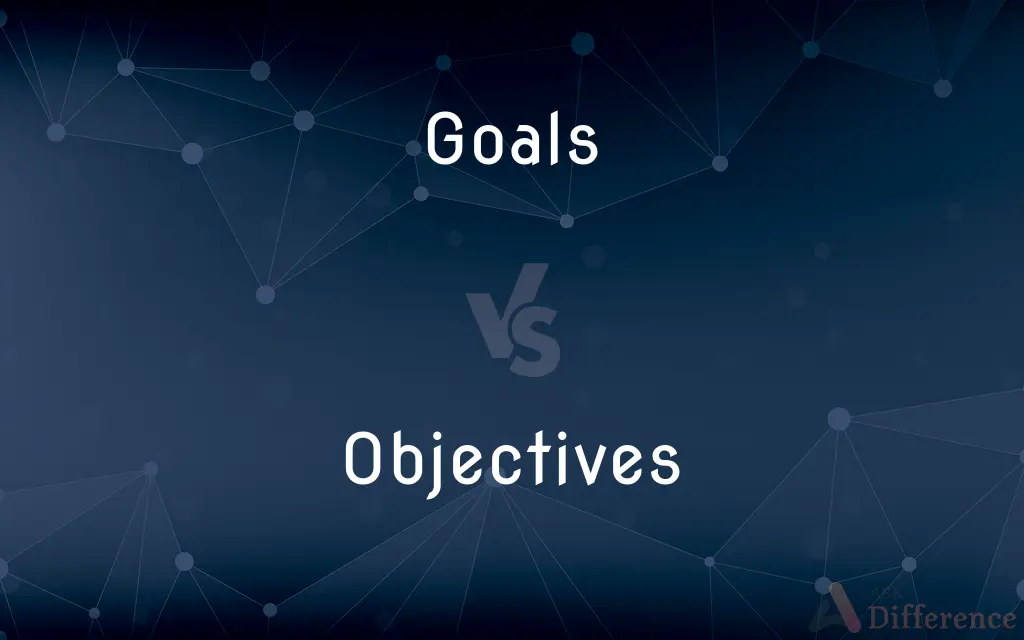Goals vs. Objectives — What's the Difference?
Edited by Tayyaba Rehman — By Fiza Rafique — Published on December 16, 2023
Goals are broad, overarching targets or destinations, while objectives are specific, measurable steps taken to achieve those goals.

Difference Between Goals and Objectives
Table of Contents
ADVERTISEMENT
Key Differences
Goals are the broader intentions set by individuals, organizations, or teams that guide their visions and plans. Objectives, on the other hand, are specific actions or measures adopted to fulfill these goals.
Goals often encapsulate an overarching purpose or ambition. They answer the "what" in terms of desired outcomes. Objectives detail the "how" – they break down the pathway to reaching the goals into actionable steps.
The timeframe for goals and objectives can differ. Goals might have a long-term focus, capturing a vision that could take years to achieve. Objectives generally have a shorter term focus, often being actions or milestones set to achieve within specific intervals leading up to the goal.
Goals, being broader, can sometimes be qualitative, driven by feelings or general ambitions. Objectives, in many cases, are quantitative, defined with clear metrics and deadlines, making them easier to measure and track.
Both goals and objectives are essential in planning processes. While goals provide direction and a sense of purpose, objectives give clarity, specificity, and a roadmap to ensure that such goals can be met.
ADVERTISEMENT
Comparison Chart
Definition
Broad intentions or destinations.
Specific, measurable steps.
Nature
General and overarching.
Specific and actionable.
Timeframe
Usually long-term.
Generally shorter term.
Qualitative vs. Quantitative
Can be qualitative.
Often quantitative with clear metrics.
Function
Provide direction and purpose.
Offer clarity and roadmap to the goals.
Compare with Definitions
Goals
Broad outcomes one wishes to achieve.
One of the company's primary goals is to increase market share.
Objectives
Detailed actions or milestones in a plan.
Our marketing objectives include launching two new campaigns this month.
Goals
Aspirations that drive action and planning.
Expanding to new regions within the next five years is among our top goals.
Objectives
Concrete steps towards fulfilling an ambition.
The organization has set objectives to improve employee retention rates.
Goals
Overarching targets set for fulfillment.
Achieving sustainability is one of the community's main goals.
Objectives
Specific tasks undertaken to reach a goal.
One of our objectives is to reduce production costs by 10%.
Goals
Desired results directing efforts and activities.
One of the project's goals is to enhance user experience.
Objectives
Measurable actions for goal achievement.
The team set clear objectives to increase sales this quarter.
Goals
Ambitions or intentions guiding decisions.
Our goal is to provide top-notch customer service.
Objectives
Targets with specific metrics and timelines.
The main objective is to onboard 50 new clients by year-end.
Goals
The object toward which an endeavor is directed; an end.
Objectives
Existing independent of or external to the mind; actual or real
Objective reality.
Goals
A structure or area into which players endeavor to propel a ball or puck in order to score points.
Objectives
Based on observable phenomena; empirical
Objective facts.
Goals
A play or shot that sends a ball or puck into or through the goal.
Objectives
Uninfluenced by emotions or personal prejudices
An objective critic.
Goals
The score awarded for such an act.
Objectives
A thing or group of things existing independent of the mind.
Goals
The finish line of a race.
Objectives
The objective case.
Goals
A noun or noun phrase referring to the place to which something moves.
Objectives
A noun or pronoun in the objective case.
Goals
See patient.
Objectives
The primary optical element, such as a lens or mirror, in a microscope, camera, telescope, or other optical instrument, that first receives light rays from the object and forms the image. Also called object glass, objective lens, object lens.
Goals
Extremely admirable; worthy of being set as a goal and emulated.
Your relationship is goals AF!
Objectives
Plural of objective
Goals
Plural of goal
Goals
Infl of goal
Common Curiosities
How do objectives differ from goals?
Objectives are specific, measurable steps to achieve goals.
Why are goals important?
Goals provide direction, purpose, and a sense of desired outcomes.
Can goals be qualitative?
Yes, goals can be qualitative, driven by general ambitions or feelings.
Are objectives always measurable?
Typically, objectives are measurable with clear metrics and deadlines.
Do objectives provide specifics?
Yes, objectives offer clarity, specificity, and a roadmap to meet goals.
What's the timeframe for objectives?
Objectives generally have a shorter term focus, often set within specific intervals.
How many objectives can one goal have?
A goal can have multiple objectives, depending on its complexity and the steps required.
What are goals?
Goals are broad outcomes or targets one wishes to achieve.
Is it necessary to measure goals?
While goals can be broad, measuring them ensures clarity and trackability.
Can goals and objectives change?
Yes, they can be adjusted based on changing circumstances or feedback.
Can a goal exist without objectives?
While possible, having objectives makes it easier to track progress toward a goal.
Which comes first, setting goals or objectives?
Typically, goals are set first, followed by objectives to achieve those goals.
How can one set effective goals?
Effective goals are clear, realistic, motivating, and aligned with one's values.
Should objectives align with goals?
Yes, objectives should directly support and lead to the achievement of goals.
Why are objectives often quantitative?
Quantitative objectives are easier to measure, track, and ensure progress.
Share Your Discovery

Previous Comparison
Vertebrates vs. Invertebrates
Next Comparison
Saturated Hydrocarbons vs. Unsaturated HydrocarbonsAuthor Spotlight
Written by
Fiza RafiqueFiza Rafique is a skilled content writer at AskDifference.com, where she meticulously refines and enhances written pieces. Drawing from her vast editorial expertise, Fiza ensures clarity, accuracy, and precision in every article. Passionate about language, she continually seeks to elevate the quality of content for readers worldwide.
Edited by
Tayyaba RehmanTayyaba Rehman is a distinguished writer, currently serving as a primary contributor to askdifference.com. As a researcher in semantics and etymology, Tayyaba's passion for the complexity of languages and their distinctions has found a perfect home on the platform. Tayyaba delves into the intricacies of language, distinguishing between commonly confused words and phrases, thereby providing clarity for readers worldwide.














































